2, October 2018
October 7: The Challenges facing Biya and Akere Muna 0
The Nkafu Policy Institute, are pleased to release a scientific, nationwide opinion pollof adult Cameroonians on the state of the economy, perceptions on governance and the democratic process, and voter preferences for the 9 presidential candidates. This survey, conducted with the support of the National Endowment for Democracy, interviewed 2,024 adult Cameroonians in all ten regions.
Interviews were conducted in 54 urban centers and 25 rural localities from September 10 to September 20, 2018. All interviews were conducted before the official start of presidential campaigns. This representative sample has a margin of error of +/- 3%.
The findings reveal a country in free fall. 79.1 percent of Cameroonians believe the economy is headed in the wrong direction. The poverty level is alarming. Less than 17.65% percent of Cameroonian adults earn more than 200,000 FCFA (~$400) dollars a month. Cameroonians are mostly concerned about the state of infrastructure in the country: electricity, water, bridges, roads, railways and sea ports.
Today, 90 percent of Cameroonians believe the road infrastructure is bad or very bad. A large majority of Cameroonians (82.17 %) want local administrators such as Governors to be elected by the people.
Cameroonians have very little confidence in the legislature (only 16.31 % support the work done at the national assembly and 14.48 at the senate); supreme court (only 18.15 % of support), central government (16.93 % of support); constitutional council (16.40 % of support).
The vast majority of Cameroonians (65.04%) believe the Anglophone conflict is the greatest threat to the security of the country and most do not support the government’s war in the Northwest and Southwest regions.
Only 7.84 % percent of Cameroonians support the use of force while 85.49 % percent believe dialogue or negotiation should be the way forward. Not surprising, the incumbent president, Paul Biya, is deeply unpopular after 36 years in power, managing only 29.82%percent of support.
Three opposition candidates stand out with the young 38-year Cabral Libii among the group with 11.24 percent. The other top two candidates being Mr. Maurice Kamto(12.65 percent) of the Cameroon Renaissance Movement and Mr. Joshua Osih(13.10 percent) of the Social Democratic Front.
The top three candidates were all within the margin of error. Mr. Libii’s is mostly supported among Francophone youths where he commands 19.37 percent support among those less than 35 years old. The biggest surprise is the very poor showing from Mr. Akere Muna, with a support of only 2.12 percent.
It is very clear today that if Cameroon’s opposition parties are seriously interested in winning the single-round presidential elections scheduled for October 7, 2018, coalescing between Mr. Libii, Mr. Kamto and Mr. Osih, or only two of the three would greatly increase their chances.
One must be worried as 49.65 percent of Cameroonians are concerned of the risk of post-electoral violence.
This survey, in very simplistic terms, shows a society in deep decay, with no sense of direction and very little agreement on the most basic processes. There is great concern that at the current pace the growing tensions between communities and various political actors may degenerate into popular uprisings as societal norms continue to be eroded.
There is great need, in the lead up to this presidential election, for a stronger involvement of the international community. It would be deeply unfortunate should the October 7 presidential elections further plunge the country deeper in crises. Strong actions must be taken to avert this real possibility. There is great yearning for a new consensus among Cameroonians, for a new beginning.
Source: Nkafu Policy Institute

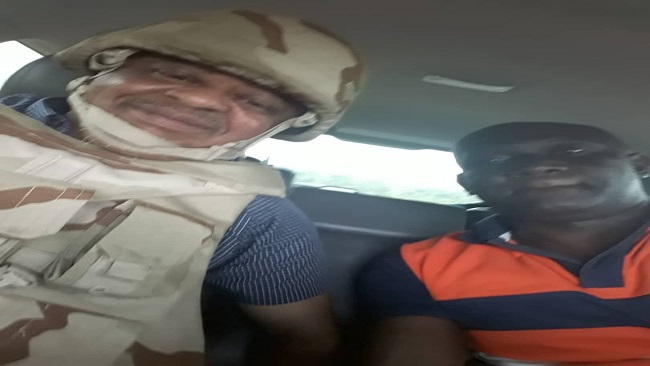
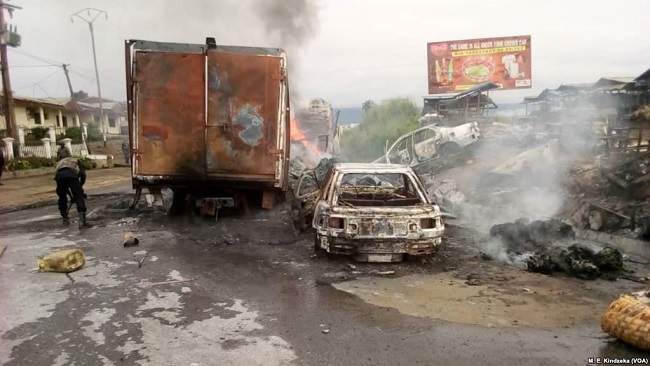

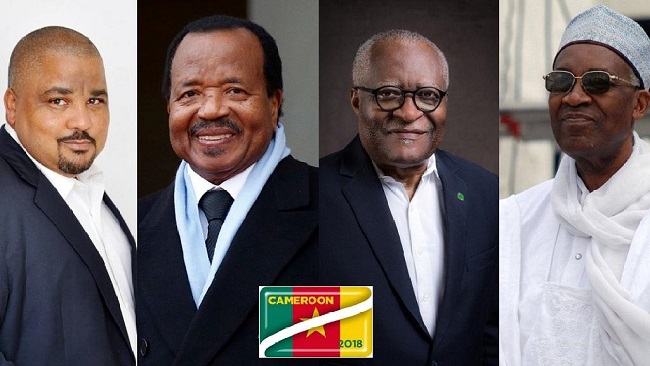
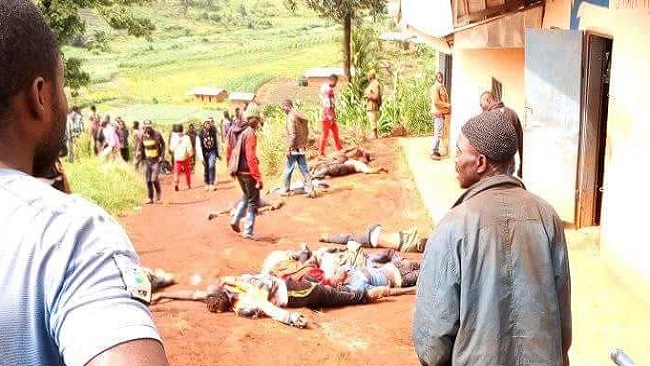

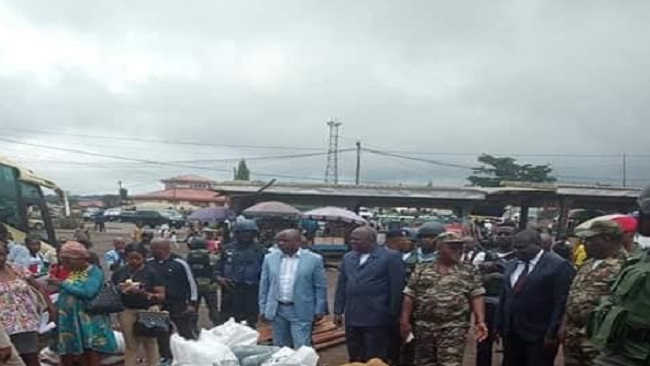

















3, October 2018
French Cameroun Counterfeit Presidential Election: Biya still frontrunner despite crises 0
More than 6.5 million Cameroonians will elect their next head of state this week but Paul Biya, president for 35 years, remains the front-runner despite a raging anglophone insurgency and jihadist threats. The central African nation of 25 million people has never staged polls amid insecurity so serious that the military is currently deployed to three of ten regions.
In the far north, soldiers are tackling the Nigeria-based jihadist group Boko Haram, while in the two anglophone regions its mission is to suppress a nascent secessionist insurgency. The separatists have threatened to disrupt voting in the areas where they operate, prompting security forces to fan out across those regions ahead of Sunday’s presidential election.
Yaounde has been adamant that polling will go ahead across the whole country, according to a minister, while Biya has downplayed the conflicts are mere “trouble”.
Violence in the English-speaking regions has flared since the beginning of the crisis at the end of 2016 while security forces have responded to protest action with heavy handed tactics and waves of arrests.
The unrest has killed more than 400 people this year, according to the International Crisis Group think-tank, and there has been an exodus from these regions ahead of the vote.
What began as a limited movement calling for greater economic opportunities and recognition of the English language quickly snowballed into a deadly fight between Cameroon’s military and heavily-armed separatists.
Attacks on symbols of Cameroonian authority including police killings and kidnappings of civil servants have mounted while some local officials have fled anglophone areas, fearing for their lives.
‘The force of experience’
Officials at the Elecam electoral commission have said that some polling stations will be “relocated” to ensure the integrity of the vote.
Despite the challenges facing the nation, Biya has drawn upon a vast network of support to ensure the ubiquity of his campaign.
Towns across the country are dotted with billboards emblazoned with Biya’s face, proclaiming him to be the “force of experience”.
At his first and so far only campaign stop, in Maroua in the far north at the weekend, Biya was feted by ministers, party flunkies and traditional leaders. His supporters appear on television daily to proclaim his accomplishments and to defend his record.
Biya’s vision for Cameroon, first published in book form in 1987, was reissued in September in time for the polls. Biya, who typically keeps a low profile, said at the Maroua campaign meeting that he would use “a firm hand and dialogue” to resolve the crisis in the anglophone region.
Eight opposition candidates will face off against Biya on Sunday – but all will confront an uphill struggle with at least one candidate accusing the incumbent of having an unfair advantage.
Unlike the three previous elections where veteran opposition chief Ni John Fru Ndi stood, the field of opposing candidates this year is wide open.
Dislodge ‘the Sphinx’
“It’s the first time in Cameroon’s history that there are opposition candidates with such clearly differentiated, truly different policies,” said Fred Eboko, a Cameroonian analyst at the French Research Institute for Development (IRD).
The candidate for the main opposition Social Democratic Front (SDF) party Joshua Osih is the contender carrying the torch for Ndi. Maurice Kamto is the insurgent candidate who has never before sought elected office and could benefit if the SDF struggles to mobilise its largely anglophone base in the conflict torn English-speaking regions.
Akere Muna, a renowned lawyer, benefits from strong overseas contacts and could benefit from protest votes cast against his better-known rivals.
No opposition coalition emerged ahead of campaigning for Sunday’s polls meaning that each of the eight challengers to Biya’s 35-year rule will have a herculean task to secure the numbers required to dislodge the leader known as “the Sphinx”.
As in 2011, an opposition upset victory looks highly unlikely. In that vote, Biya won 77.98% with both Washington and Paris warning that there were “numerous irregularities” in the conduct of the polls. The opposition, the Catholic church and a number of action groups have said they will deploy observers to deter and detect vote fraud.
Whoever wins at the ballot box, the victor will face immense challenges. Just 10% of working age people are in formal employment, one-third of Cameroonians live on less than $2.30 a day, and three in four people have only known Biya as their leader.
Source: News 24